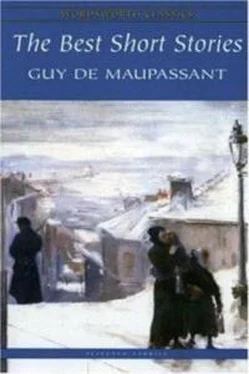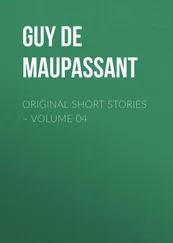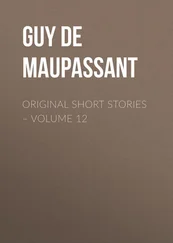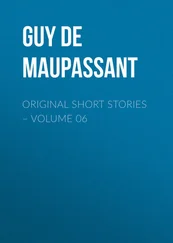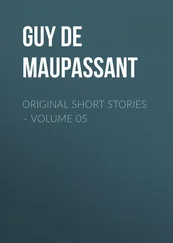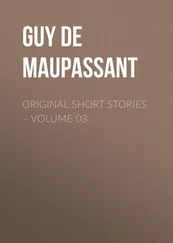Sharper, more penetrating still than the year before, the cold made her suffer continually.
She stretched out her shivering hands to the big flames. The glaring fire burned her face; but icy whiffs seemed to glide down her back and to penetrate between her skin and her underclothing. And she shivered from head to foot. Innumerable draughts of air appeared to have taken up their abode in the apartment, living, crafty currents of air as cruel as enemies. She encountered them at every moment; they blew on her incessantly their perfidious and frozen hatred, now on her face, now on her hands, and now on her back.
Once more she spoke of a furnace; but her husband listened to her request as if she were asking for the moon. The introduction of such an apparatus at Parville appeared to him as impossible as the discovery of the Philosopher's Stone.
Having been at Rouen on business one day, he brought back to his wife a dainty foot warmer made of copper, which he laughingly called a "portable furnace"; and he considered that this would prevent her henceforth from ever being cold.
Toward the end of December she understood that she could not always live like this, and she said timidly one evening at dinner:
"Listen, dear! Are we, not going to spend a week or two in Paris before spring:"
He was stupefied.
"In Paris? In Paris? But what are we to do there? Ah! no by Jove! We are better off here. What odd ideas come into your head sometimes."
She faltered:
"It might distract us a little."
He did not understand.
"What is it you want to distract you? Theatres, evening parties, dinners in town? You knew, however, when you came here, that you ought not to expect any distractions of this kind!"
She saw a reproach in these words, and in the tone in which they were uttered. She relapsed into silence. She was timid and gentle, without resisting power and without strength of will.
In January the cold weather returned with violence. Then the snow covered the earth.
One evening, as she watched the great black cloud of crows dispersing among the trees, she began to weep, in spite of herself.
Her husband came in. He asked in great surprise:
"What is the matter with you?"
He was happy, quite happy, never having dreamed of another life or other pleasures. He had been born and had grown up in this melancholy district. He felt contented in his own house, at ease in body and mind.
He did not understand that one might desire incidents, have a longing for changing pleasures; he did not understand that it does not seem natural to certain beings to remain in the same place during the four seasons; he seemed not to know that spring, summer, autumn, and winter have, for multitudes of persons, fresh amusements in new places.
She could say nothing in reply, and she quickly dried her eyes. At last she murmured in a despairing tone:
"I am—I—I am a little sad—I am a little bored."
But she was terrified at having even said so much, and added very quickly:
"And, besides—I am—I am a little cold."
This last plea made him angry.
"Ah! yes, still your idea of the furnace. But look here, deuce take it! you have not had one cold since you came here."
Night came on. She went up to her room, for she had insisted on having a separate apartment. She went to bed. Even in bed she felt cold. She thought:
"It will be always like this, always, until I die."
And she thought of her husband. How could he have said:
"You—have not had one cold since you came here"?
She would have to be ill, to cough before he could understand what she suffered!
And she was filled with indignation, the angry indignation of a weak, timid being.
She must cough. Then, perhaps, he would take pity on her. Well, she would cough; he should hear her coughing; the doctor should be called in; he should see, her husband, he should see.
She got out of bed, her legs and her feet bare, and a childish idea made her smile:
"I want a furnace, and I must have it. I shall cough so much that he'll have to put one in the house."
And she sat down in a chair in her nightdress. She waited an hour, two hours. She shivered, but she did not catch cold. Then she resolved on a bold expedient.
She noiselessly left her room, descended the stairs, and opened the gate into the garden.
The earth, covered with snows seemed dead. She abruptly thrust forward her bare foot, and plunged it into the icy, fleecy snow. A sensation of cold, painful as a wound, mounted to her heart. However, she stretched out the other leg, and began to descend the steps slowly.
Then she advanced through the grass saying to herself:
"I'll go as far as the pine trees."
She walked with quick steps, out of breath, gasping every time she plunged her foot into the snow.
She touched the first pine tree with her hand, as if to assure herself that she had carried out her plan to the end; then she went back into the house. She thought two or three times that she was going to fall, so numbed and weak did she feel. Before going in, however, she sat down in that icy fleece, and even took up several handfuls to rub on her chest.
Then she went in and got into bed. It seemed to her at the end of an hour that she had a swarm of ants in her throat, and that other ants were running all over her limbs. She slept, however.
Next day she was coughing and could not get up.
She had inflammation of the lungs. She became delirious, and in her delirium she asked for a furnace. The doctor insisted on having one put in. Henry yielded, but with visible annoyance.
She was incurable. Her lungs were seriously affected, and those about her feared for her life.
"If she remains here, she will not last until the winter," said the doctor.
She was sent south. She came to Cannes, made the acquaintance of the sun, loved the sea, and breathed the perfume of orange blossoms.
Then, in the spring, she returned north.
But she now lived with the fear of being cured, with the fear of the long winters of Normandy; and as soon as she was better she opened her window by night and recalled the sweet shores of the Mediterranean.
And now she is going to die. She knows it and she is happy.
She unfolds a newspaper which she has not already opened, and reads this heading:
"The first snow in Paris."
She shivers and then smiles. She looks across at the Esterel, which is becoming rosy in the rays of the setting sun. She looks at the vast blue sky, so blue, so very blue, and the vast blue sea, so very blue also, and she rises from her seat.
And then she returned to the house with slow steps, only stopping to cough, for she had remained out too long and she was cold, a little cold.
She finds a letter from her husband. She opens it, still smiling, and she reads:
"MY DEAR LOVE: I hope you are well, and that you do not regret too much our beautiful country. For some days last we have had a good frost, which presages snow. For my part, I adore this weather, and you my believe that I do not light your damned furnace."
She ceases reading, quite happy at the thought that she had her furnace put in. Her right hand, which holds the letter, falls slowly on her lap, while she raises her left hand to her mouth, as if to calm the obstinate cough which is racking her chest.
Sundays of a Bourgeois
Reparations for the Excursion
M. Patissot, born in Paris, after having failed in his examinations at the College Henri IV., like many others, had entered the government service through the influence of one of his aunts, who kept a tobacco store where the head of one of the departments bought his provisions.
He advanced very slowly, and would, perhaps, have died a fourth–class clerk without the aid of a kindly Providence, which sometimes watches over our destiny. He is today fifty–two years old, and it is only at this age that he is beginning to explore, as a tourist, all that part of France which lies between the fortifications and the provinces.
Читать дальше
